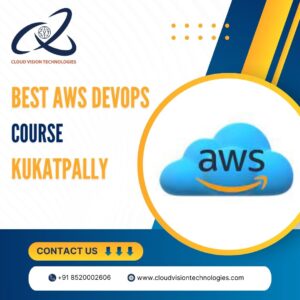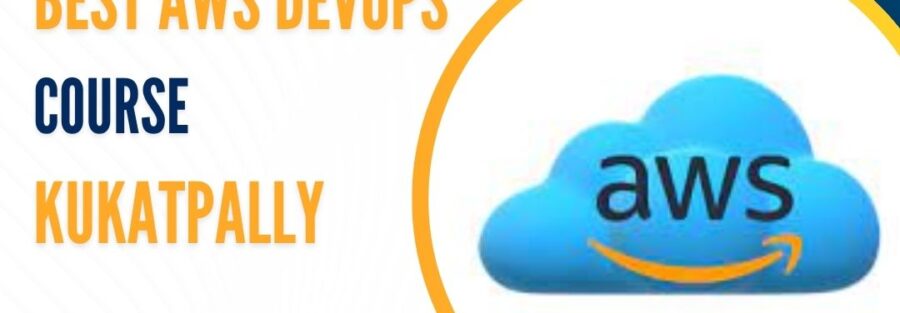Introduction
In today’s fast-paced software development landscape, DevOps has become a crucial methodology for automating processes and enhancing collaboration between development and operations teams. Amazon Web Services (AWS) provides a comprehensive set of tools and services to implement DevOps practices efficiently. In this blog, we will explore AWS DevOps, its benefits, and key services that help streamline development and deployment workflows. Cloud Vision Technologies.
What is AWS DevOps?
AWS DevOps is a combination of cloud computing services, tools, and best practices designed to enhance collaboration between development and operations teams. It enables organizations to automate software development, testing, deployment, and infrastructure management, ensuring faster and more reliable application delivery. By integrating continuous integration (CI) and continuous deployment (CD) pipelines, AWS DevOps helps developers push code changes efficiently while minimizing errors. Best AWS DevOps Course Kukatpally.
Additionally, AWS provides scalable and secure infrastructure, allowing businesses to optimize resources based on demand. With automation tools like AWS CodePipeline, AWS CodeBuild, and AWS CodeDeploy, teams can streamline workflows, reduce manual intervention, and improve software quality. AWS DevOps also incorporates monitoring and logging services such as AWS CloudWatch and AWS X-Ray, which provide real-time insights into application performance and system health. By adopting DevOps practices on AWS, organizations can achieve greater agility, security, and cost efficiency, making it easier to manage complex cloud-based applications. Best AWS DevOps Course Kukatpally.

Why AWS for DevOps?
Scalability
One of the biggest advantages of AWS for DevOps is its scalability. AWS provides on-demand resources, allowing businesses to scale their applications up or down based on workload demands. Whether you need to handle a sudden spike in traffic or optimize costs during low usage periods, AWS auto-scaling ensures that your infrastructure adapts dynamically. Services like Amazon EC2, AWS Lambda, and Elastic Load Balancing (ELB) help maintain high availability and performance without manual intervention. This flexibility is crucial for DevOps teams managing dynamic application environments. Best AWS DevOps Course Kukatpally.
Automation
AWS offers a comprehensive suite of automation tools that streamline the entire software development lifecycle. With AWS CodePipeline, AWS CodeBuild, and AWS CodeDeploy, teams can automate CI/CD workflows, reducing the need for manual deployments and testing. Infrastructure as Code (IaC) tools like AWS CloudFormation and AWS CDK allow organizations to define, provision, and manage infrastructure using code, making infrastructure deployment faster, more consistent, and less error-prone. This automation accelerates development cycles and enhances productivity, enabling DevOps teams to focus on innovation rather than routine maintenance. Best AWS DevOps Course Kukatpally.
Security
Security is a top priority in DevOps, and AWS provides robust security mechanisms to protect applications and infrastructure. With AWS Identity and Access Management (IAM), teams can define strict access controls to ensure only authorized users and services interact with resources. AWS also offers encryption at rest and in transit, along with security monitoring tools like AWS Security Hub and AWS Shield to detect threats and mitigate attacks. Compliance with industry standards like ISO, SOC, and GDPR ensures that businesses can confidently deploy applications while maintaining security and regulatory compliance. Best AWS DevOps Course Kukatpally.
Cost-effectiveness
AWS follows a pay-as-you-go pricing model, allowing businesses to optimize costs by only paying for the resources they use. Unlike traditional infrastructure, where companies must invest in expensive hardware upfront, AWS provides cost-effective solutions that scale with business needs. Services like AWS Savings Plans, Spot Instances, and AWS Cost Explorer help organizations manage expenses efficiently. This flexibility ensures that startups, enterprises, and DevOps teams can build and deploy applications without worrying about unnecessary infrastructure costs. Best AWS DevOps Course Kukatpally.
Key AWS DevOps Services:
AWS offers a suite of DevOps services that help automate software development, deployment, and infrastructure management. These services enable organizations to build, test, and deploy applications seamlessly while ensuring high availability and scalability. Below are some of the key AWS DevOps services and their functionalities:
AWS CodePipeline
AWS CodePipeline is a fully managed continuous integration and continuous delivery (CI/CD) service that automates the software release process. It enables developers to build, test, and deploy applications efficiently by integrating with various source control and deployment tools such as AWS CodeCommit, GitHub, and Jenkins. CodePipeline ensures smooth code transitions from development to production, minimizing manual interventions and reducing deployment risks. Best AWS DevOps Course Kukatpally.
AWS CodeBuild
AWS CodeBuild is a cloud-based continuous integration (CI) service that compiles source code, runs tests, and packages software for deployment. It eliminates the need for managing build servers, as AWS handles the underlying infrastructure. CodeBuild supports multiple programming languages and build environments, allowing developers to create customizable build workflows. With scalable and parallel execution, it ensures faster software delivery while maintaining code quality. Best AWS DevOps Course Kukatpally.
AWS CodeDeploy
AWS CodeDeploy automates the deployment of applications to Amazon EC2 instances, AWS Lambda functions, and on-premises servers. It reduces downtime and minimizes human errors by handling complex deployment processes automatically. CodeDeploy supports both rolling and blue-green deployment strategies, ensuring minimal service interruptions while updating applications. It also provides real-time monitoring and rollback capabilities, enhancing deployment reliability. Best AWS DevOps Course Kukatpally.
AWS CodeCommit
AWS CodeCommit is a secure, scalable, and fully managed Git-based source control service that allows developers to store and manage their code repositories. It eliminates the need for hosting and maintaining Git servers, providing seamless collaboration among team members. CodeCommit integrates with AWS DevOps tools such as CodePipeline and CodeBuild, enabling automated build and deployment workflows. Its strong encryption and IAM-based access control enhance security. Best AWS DevOps Course Kukatpally.
AWS Elastic Beanstalk
AWS Elastic Beanstalk simplifies application deployment by automatically handling infrastructure provisioning, scaling, and monitoring. Developers can deploy applications without worrying about underlying hardware configurations. It supports multiple programming languages, including Java, Python, PHP, Node.js, and Ruby, making it a versatile choice for different development teams. Elastic Beanstalk also provides built-in auto-scaling, ensuring applications can handle variable workloads efficiently. Best AWS DevOps Course Kukatpally.
AWS CloudFormation
AWS CloudFormation allows organizations to automate infrastructure provisioning using code. It follows the Infrastructure as Code (IaC) approach, enabling developers to define cloud resources in a template file and deploy them consistently across environments. CloudFormation eliminates manual configuration errors, accelerates infrastructure deployment, and supports version-controlled infrastructure management, making it a vital tool for DevOps teams. Best AWS DevOps Course Kukatpally.
AWS CloudWatch
AWS CloudWatch is a monitoring and observability service that provides real-time insights into application performance, resource utilization, and system health. It collects and analyzes logs, metrics, and event data from AWS resources and applications, enabling proactive troubleshooting and performance optimization. CloudWatch also allows setting up alarms and automated responses to maintain system reliability and reduce downtime. Best AWS DevOps Course Kukatpally.
AWS Lambda
AWS Lambda is a serverless computing service that runs code in response to events without provisioning or managing servers. It supports various programming languages, including Python, Java, and Node.js, making it easy to integrate into DevOps workflows. Lambda is ideal for executing automated tasks, processing real-time data, and integrating with AWS services like API Gateway and DynamoDB. Its pay-per-use pricing model optimizes costs by charging only for execution time. Best AWS DevOps Course Kukatpally.
AWS ECS & EKS (Containers and Kubernetes)
Containers play a crucial role in modern DevOps workflows, and AWS provides two powerful services for container management: Best AWS DevOps Course Kukatpally.
Amazon ECS (Elastic Container Service): A fully managed service that simplifies the deployment, scaling, and management of Docker containerized applications. ECS integrates seamlessly with AWS Fargate, enabling serverless container management.
Amazon EKS (Elastic Kubernetes Service): A fully managed Kubernetes service that helps organizations run and scale containerized applications with Kubernetes. EKS automates cluster management, improves security, and integrates with AWS networking and storage services. Best AWS DevOps Course Kukatpally.

AWS DevOps Best Practices:
Adopting DevOps on AWS requires following best practices to enhance automation, scalability, security, and efficiency. Below are some key AWS DevOps best practices that help teams streamline software development and deployment processes.
Implement CI/CD Pipelines to Automate Builds and Deployments
Continuous Integration and Continuous Deployment (CI/CD) pipelines are fundamental to DevOps, ensuring seamless software development and deployment. AWS CodePipeline, AWS CodeBuild, and AWS CodeDeploy work together to automate code compilation, testing, and deployment processes. By implementing a CI/CD pipeline, developers can push code changes frequently, reduce integration issues, and accelerate application releases. Automated testing in the pipeline also helps catch bugs early, ensuring high-quality software delivery. Best AWS DevOps Course Kukatpally.
Use Infrastructure as Code (IaC) with AWS CloudFormation or Terraform
Infrastructure as Code (IaC) enables teams to define and manage cloud resources using code instead of manual provisioning. AWS CloudFormation allows developers to create templates that define the desired infrastructure setup, ensuring consistent deployments across environments. Terraform, another popular IaC tool, supports AWS and allows multi-cloud infrastructure management. Using IaC eliminates manual errors, improves deployment speed, and enhances infrastructure version control, making it easier to roll back to previous configurations if needed. Best AWS DevOps Course Kukatpally.
Enable Monitoring and Logging with AWS CloudWatch and AWS X-Ray
Monitoring application performance and system health is crucial in DevOps to ensure smooth operations. AWS CloudWatch provides real-time logs, metrics, and alarms to monitor AWS resources, helping teams detect and troubleshoot issues proactively. AWS X-Ray enables distributed tracing, helping developers analyze and debug microservices-based applications. By integrating these monitoring tools into the DevOps workflow, teams can gain valuable insights into application performance, identify bottlenecks, and optimize system efficiency. Best AWS DevOps Course Kukatpally.
Secure Your Environment Using IAM Roles and Policies
Security is a top priority in DevOps, and AWS Identity and Access Management (IAM) plays a key role in protecting cloud resources. IAM enables teams to define fine-grained access control, ensuring that only authorized users and services can access specific resources. By following the principle of least privilege (PoLP), organizations can minimize security risks. Additionally, enforcing multi-factor authentication (MFA), encrypting data, and regularly auditing access logs enhance security measures in AWS DevOps environments.
Automate Deployments with AWS CodeDeploy
Manually deploying applications increases the risk of errors and downtime. AWS CodeDeploy automates the deployment process, ensuring smooth and reliable application releases. It supports rolling updates, blue-green deployments, and canary deployments, reducing downtime and minimizing the impact of failures. CodeDeploy integrates seamlessly with AWS EC2 instances, AWS Lambda, and on-premises servers, providing a consistent deployment experience across different environments. Best AWS DevOps Course Kukatpally.
Use Containerization with Docker and Kubernetes for Microservices
Containerization helps developers package applications along with their dependencies, ensuring consistency across different environments. AWS Elastic Container Service (ECS) and Amazon Elastic Kubernetes Service (EKS) enable teams to manage and orchestrate containerized applications efficiently. Docker simplifies application packaging, while Kubernetes provides advanced orchestration features such as load balancing, auto-scaling, and self-healing capabilities. By leveraging containerization, DevOps teams can deploy applications faster, scale efficiently, and improve resource utilization. Best AWS DevOps Course Kukatpally.
Best Practices for AWS DevOps Implementation:
To successfully implement AWS DevOps, organizations should follow best practices that ensure automation, efficiency, security, and scalability. These practices streamline software development, enhance system reliability, and improve operational workflows. Best AWS DevOps Course Kukatpally.
Implement CI/CD Pipelines:
A well-structured Continuous Integration and Continuous Deployment (CI/CD) pipeline is essential for efficient software delivery. AWS provides AWS CodePipeline to automate the entire release cycle, from code integration to deployment. Developers can leverage AWS CodeBuild to compile and test applications automatically, ensuring that only high-quality code progresses to the next stage. Once the application is tested, AWS CodeDeploy automates software deployment, allowing seamless rollouts with minimal downtime. By adopting CI/CD pipelines, teams can accelerate development cycles, reduce manual errors, and maintain a consistent deployment process. Best AWS DevOps Course Kukatpally.
Use Infrastructure as Code (IaC):
Infrastructure as Code (IaC) is a key practice in AWS DevOps that automates infrastructure provisioning and management. Using tools like AWS CloudFormation or Terraform, teams can define infrastructure configurations in templates, ensuring consistency and repeatability. These infrastructure templates can be stored in Git repositories, allowing version control, collaboration, and rollback capabilities if needed. By adopting IaC, organizations eliminate the risks associated with manual provisioning, enhance scalability, and ensure that infrastructure deployments remain standardized across environments. Best AWS DevOps Course Kukatpally.
Enable Continuous Monitoring:
Effective monitoring is crucial to maintaining the health and performance of applications and infrastructure. AWS provides Amazon CloudWatch, which collects real-time metrics, logs, and events, enabling teams to detect anomalies and set up automated alerts for proactive issue resolution. Additionally, AWS X-Ray provides distributed tracing, helping developers analyze API calls, identify bottlenecks, and debug performance issues. Organizations should also store logs in Amazon S3 or AWS CloudTrail for security auditing, compliance tracking, and historical analysis. By enabling continuous monitoring, DevOps teams can maintain application reliability, troubleshoot issues faster, and optimize system performance.
Leverage Containerization & Orchestration:
Containers play a crucial role in modern DevOps workflows by enabling lightweight, portable, and scalable applications. AWS provides Amazon ECS (Elastic Container Service) and Amazon EKS (Elastic Kubernetes Service) for container orchestration, allowing businesses to efficiently manage containerized applications. For serverless container management, AWS Fargate eliminates the need for provisioning and managing infrastructure, automatically scaling containers based on workload demands. By leveraging containerization and orchestration, organizations can improve application deployment efficiency, enhance resource utilization, and enable seamless scaling of microservices.

Best AWS DevOps Course Kukatpally:
Enforce Security Best Practices:
Security is a top priority in any DevOps implementation. AWS offers robust security features that help enforce access control, data protection, and compliance management. Using AWS Identity and Access Management (IAM), teams can define fine-grained permissions to restrict access to AWS resources, ensuring that only authorized users can modify critical infrastructure. AWS Secrets Manager securely stores sensitive credentials such as API keys and database passwords, preventing unauthorized access. Additionally, AWS Config automates compliance checks by continuously monitoring AWS resources and detecting deviations from security policies. Implementing these security best practices helps organizations mitigate risks, protect sensitive data, and maintain regulatory compliance.
Scale Applications Dynamically
Modern applications experience fluctuating workloads, requiring an automated scaling approach to optimize resource usage and ensure high availability. AWS DevOps enables dynamic scaling through AWS Auto Scaling, which automatically adjusts compute resources based on real-time demand. This ensures that applications remain responsive under high traffic loads while reducing costs during low-traffic periods. Additionally, Elastic Load Balancer (ELB) distributes incoming traffic across multiple instances, preventing server overload and improving overall system performance. By implementing dynamic scaling, organizations can enhance application availability, optimize costs, and deliver a seamless user experience. Best AWS DevOps Course Kukatpally.
Real-World Use Cases of AWS DevOps
AWS DevOps has transformed how organizations develop, deploy, and manage applications at scale. Leading companies leverage AWS DevOps to enhance automation, improve system reliability, and accelerate innovation. Here’s how some of the world’s biggest brands utilize AWS DevOps for their operations:
Netflix – Rapid Content Deployment & Auto-Scaling
Netflix, a global leader in video streaming, heavily relies on AWS DevOps to ensure a seamless viewing experience for millions of users worldwide. The company uses AWS Auto Scaling to handle unpredictable surges in user traffic, ensuring that streaming services remain fast and responsive, even during peak hours. Best AWS DevOps Course Kukatpally.
By leveraging AWS CodePipeline and AWS CodeDeploy, Netflix automates software updates and new feature rollouts without causing service disruptions. Additionally, Amazon CloudWatch continuously monitors application performance, detecting potential issues before they impact users. This highly automated DevOps strategy allows Netflix to deploy thousands of code changes daily, ensuring constant innovation while maintaining exceptional performance and reliability. Best AWS DevOps Course Kukatpally.
Amazon – High-Speed Software Delivery & Real-Time Analytics
Amazon, the world’s largest e-commerce company, uses AWS DevOps to power its vast digital ecosystem. The company requires high-speed software delivery to keep up with customer demand, improve user experience, and introduce new features seamlessly.
Amazon implements CI/CD pipelines using AWS CodePipeline, ensuring that new features, security updates, and bug fixes are delivered rapidly across multiple services. AWS DevOps also enables real-time data analytics, with tools like AWS Lambda and Amazon Kinesis processing millions of transactions per second to enhance personalized recommendations, fraud detection, and inventory management. Best AWS DevOps Course Kukatpally.
Security is another crucial aspect of Amazon’s operations. By utilizing AWS IAM, AWS Secrets Manager, and AWS Config, the company enforces strict security policies and automates compliance checks to protect customer data and maintain regulatory standards.
Airbnb – Automated Infrastructure & Seamless Scalability
Airbnb, a leading online marketplace for short-term rentals, relies on AWS DevOps to manage its dynamic and global infrastructure efficiently. With millions of users booking accommodations daily, Airbnb needs a scalable and resilient cloud environment to ensure smooth operations. Best AWS DevOps Course Kukatpally.
By leveraging AWS CloudFormation and Terraform, Airbnb automated infrastructure provisioning, ensuring that new resources are deployed consistently and efficiently across multiple regions. This Infrastructure as Code (IaC) approach enables Airbnb to quickly expand its cloud footprint while maintaining high availability.
For containerized workloads, Airbnb uses Amazon ECS and AWS Fargate, allowing them to manage microservices efficiently without worrying about underlying infrastructure. Additionally, Airbnb employs Amazon CloudWatch and AWS X-Ray for continuous monitoring, providing real-time insights into application performance and system health.
By integrating AWS DevOps best practices, Airbnb has achieved rapid deployment cycles, improved resource utilization, and enhanced user experience, making it one of the most scalable and reliable travel platforms in the world. Best AWS DevOps Course Kukatpally.
Future of AWS DevOps:
As cloud computing, automation, and AI-driven technologies continue to advance, AWS DevOps is poised to become even more integral to modern software development and operations. Organizations that embrace AWS DevOps will gain a competitive edge by accelerating innovation, reducing costs, and improving system reliability.
AI-Driven DevOps Automation
The future of AWS DevOps will see greater integration of Artificial Intelligence (AI) and Machine Learning (ML) to enhance predictive analytics, anomaly detection, and automated decision-making. AI-powered DevOps tools will help organizations:
Automatically detect and resolve system issues before they cause downtime. Optimize CI/CD pipelines by predicting build failures and improving test automation. Enhance security through AI-driven threat detection and automated vulnerability patching.
AWS already provides AI-driven services like Amazon DevOps Guru, which uses ML to analyze operational data and detect issues proactively. This trend will continue evolving, leading to even smarter automation and self-healing infrastructure. Best AWS DevOps Course Kukatpally.
Serverless Computing & AWS DevOps
The rise of serverless computing is transforming the way applications are built and deployed. AWS Lambda, AWS Fargate, and Amazon API Gateway allow developers to focus on writing code without worrying about managing infrastructure. AWS DevOps will play a crucial role in optimizing serverless deployments by:
Automating deployments of serverless applications using AWS CodePipeline and AWS SAM (Serverless Application Model). Integrating with event-driven architectures for real-time data processing and microservices orchestration. Best AWS DevOps Course Kukatpally.
Enhancing cost efficiency, as organizations only pay for the compute power they use, reducing operational expenses. As more businesses adopt serverless models, AWS DevOps will become even more essential in ensuring efficient, automated, and scalable deployments.
Hybrid & Multi-Cloud DevOps Strategies
Many enterprises are adopting hybrid cloud (combining on-premises infrastructure with cloud services) and multi-cloud (using multiple cloud providers) strategies to enhance flexibility, avoid vendor lock-in, and optimize performance. AWS DevOps will adapt to these trends by:
Supporting multi-cloud CI/CD pipelines, enabling seamless deployments across AWS, Azure, and Google Cloud. Providing hybrid cloud monitoring using tools like AWS Systems Manager and Amazon CloudWatch to manage resources across different environments. Enabling Kubernetes-based workloads with Amazon EKS Anywhere, allowing organizations to run Kubernetes clusters on-premises while integrating with AWS services. As businesses seek more cloud flexibility and control, AWS DevOps will play a vital role in simplifying hybrid and multi-cloud workflows. Best AWS DevOps Course Kukatpally.
Low-Code & No-Code DevOps
The demand for low-code and no-code development platforms is increasing, enabling businesses to build applications with minimal coding expertise. AWS DevOps will support these platforms by: Providing integrated CI/CD solutions for deploying low-code applications. Enhancing workflow automation for faster application delivery. Offering drag-and-drop DevOps tools that allow non-technical users to manage deployments effortlessly.

Conclusion:
AWS DevOps is a powerful combination that enables organizations to accelerate software delivery and improve operational efficiency. By leveraging AWS tools and best practices, teams can build, deploy, and manage applications seamlessly in the cloud. Whether you are a beginner or an experienced DevOps engineer, AWS provides the right set of services to enhance your DevOps journey. Best AWS DevOps Course Kukatpally.
Address: Cloud Vision Technologies
Location: Samhitha Enclave, 3rd floor, KPHB Phase 9, Kukatpally, Hyderabad, Telangana – 500072
Contact Number : +91 8520002606
Mail ID: info@cloudvisiontechnologies.com
Website: https://cloudvisiontechnologies.com




